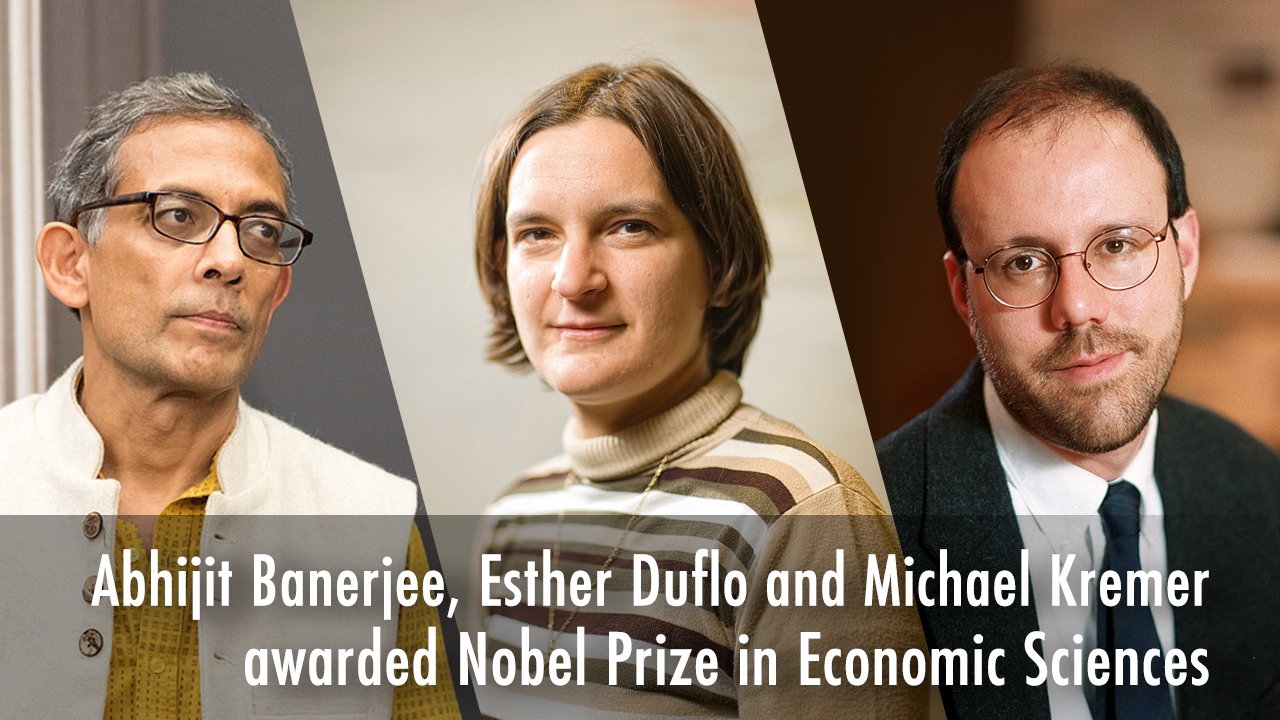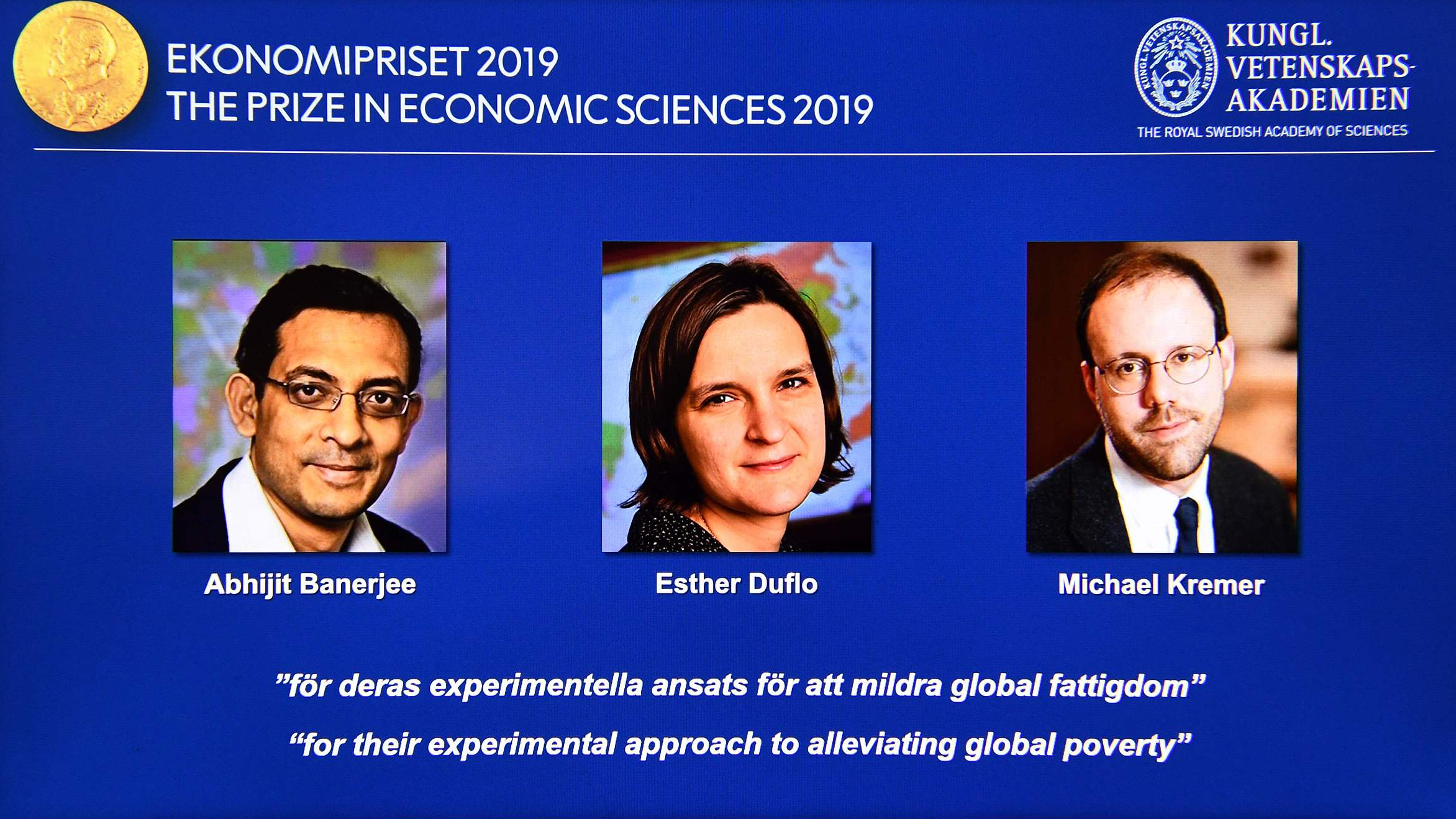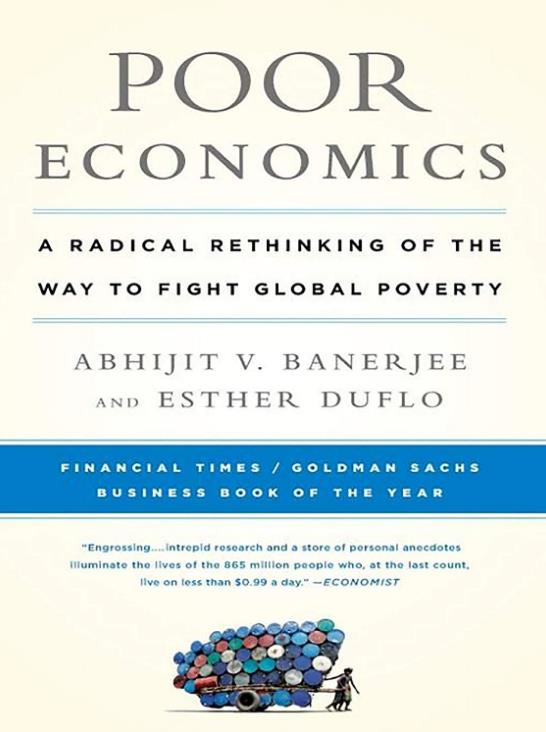01:22

Abhijit Banerjee, Esther Duflo and Michael Kremer are the joint winners of the 2019 Nobel Prize in Economic Sciences for their experimental approach to alleviating global poverty, including novel initiatives in education and healthcare, the Royal Swedish Academy of Sciences announced on Monday.
French-American Duflo becomes only the second female economics winner in the prize's 50-year history, as well as the youngest at 46. She shares the award equally with Indian-born American Banerjee and Kremer, also of the United States. Banerjee, 58, and Duflo are both professors at the Massachusetts Institute of Technology (MIT), while Kremer, 54, is a professor at Harvard University.
Read more: Nobel Prize in Economics: Where are all the women?
The science academy said that "more than 700 million people still subsist on extremely low incomes," and that around five million children under the age of five still die every year from preventable or curable diseases. The three economists had shown how the problem of poverty could be tackled by breaking it down into smaller and more precise questions in areas such as education and healthcare, making problems easier to tackle.

Portraits of Abhijit Banerjee, Esther Duflo, and Michael Kremer, winners of the Nobel Prize in Economic Sciences 2019, at a news conference at the Royal Swedish Academy of Sciences in Stockholm, Sweden, October 14, 2019. /VCG Photo
Portraits of Abhijit Banerjee, Esther Duflo, and Michael Kremer, winners of the Nobel Prize in Economic Sciences 2019, at a news conference at the Royal Swedish Academy of Sciences in Stockholm, Sweden, October 14, 2019. /VCG Photo
The Nobel couple fighting poverty
Duflo was the second female Nobel economics winner, before that, Indiana University professor Elinor Ostrom became the first woman to be awarded the Nobel Prize for Economic Sciences.
Duflo said she is "humbled" to win this year's Nobel prize and hopes it will "inspire many, many other women."
"Showing that it is possible for a woman to succeed and be recognised for success I hope is going to inspire many, many other women to continue working and many other men to give them the respect that they deserve like every single human being."
Showing that it is possible for a woman to succeed and be recognised for success I hope is going to inspire many, many other women to continue working and many other men to give them the respect that they deserve like every single human being.
- Esther Duflo, MIT economist and winner of Nobel Prize for Economic Sciences
Her husband, Indian-born Banerjee, is also one of the other winners and her PhD supervisor. He grew up in a completely different world from Duflo.
When Duflo read a comic book at the age of six describing Kolkata (formerly known as Calcutta), in India, as an overcrowded city, where each person lived in a 10 square feet space, Banerjee knew exactly how the poor lived by looking out of his window in Kolkata.
"This urge to reduce the poor to a set of clichés has been with us for as long as there has been poverty. The poor appear, in social theory, as much as much in literature, by turns lazy or enterprising, noble or thievish, angry or passive, helpless or self-sufficient," Banerjee and Duflo wrote in their book, Poor Economics.

Cover of Poor Economics. /Amazon screenshot
Cover of Poor Economics. /Amazon screenshot
The Nobel couple's work, alongside that of Prof Kremer's, has focused on poor communities in India and Africa. Their research illustrates which investments are worth making and which ones have the most impact on the poorest people.
From the office to the school
"As a direct result of one of their studies, more than five million Indian children have benefited from effective programs of remedial tutoring in school," the academy said in a statement.
"Another example is the heavy subsidies for preventive healthcare that have been introduced in many countries."
The prize, worth nine million Swedish crowns (915,300 U.S. dollars), is a later addition to the five awards created in the will of industrialist and dynamite inventor Alfred Nobel. It was established by the Swedish central bank and first awarded in 1969.
Economics is the last of the awards to be announced. Winners for medicine, physics, chemistry, literature and peace have been unveiled over the course of last week.
The 2018 Nobel Economics Prize was jointly awarded to U.S. economists William Nordhaus and Paul Romer, pioneers in adapting the Western economic growth model to focus on environmental issues and sharing the benefits of technology.
(With input from Reuters)